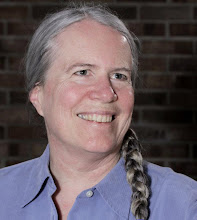I am on the pastoral care committee for my church and we had a meeting yesterday evening. Someone brought up the topic of people not feeling it is ok to talk about their problems in church. I piped up with a general statement that grew out of my present situation, which almost everyone in the group knows (a couple of people who weren't at the last meeting may not know). I said I want to take a class in how to accept help. One person liked the idea very much--she wanted to take that class too--and others liked it in theory but either weren't sure people would come or thought it should be something other than a class (like a sermon).
The rector (which is what we Episcopalians call our senior pastor) said that he thought people didn't ask for help because they don't want to show weakness. I didn't respond immediately because the meeting had gone on too long already, but afterwards I sent him the following email:
I'm working on learning to ask for help, but I really don't know how.I don’t think the primary reason people don’t ask for help is fear of appearing weak. I see several other reasons as important:
- Other people have more serious problems--I shouldn’t ask for help because other people need it more
- I don’t know what to ask for—I imagine there is a menu but I don’t know what is on it and I’m afraid I will disturb people if I ask for something that isn’t on the menu
- I am afraid that other people will think I am asking for too much, taking more than my share
- I don’t know at what point it is appropriate to ask for help and I don’t want to violate the unspoken rules
- I’m afraid the unspoken rule is: If I can possibly do it myself then I shouldn’t ask for help. If it is only appropriate to ask for help when there is no other choice then I’m not sure I have reached that point
I think my wish for a class or workshop is on one level a wish for someone to tell me the unspoken rules. Clearly I’m stuck in wanting to be good, to do it right. (Beneath all that is fear that I don’t deserve help.) Instead of rules, what would actually help me is stories/testimonies of different kinds of help given and how the giver didn’t resent it, so I can imagine such scenarios.
I will give you an example. Is it appropriate to ask if someone (perhaps a current or former youth leader) would do practice driving with my son, who is 18 and hasn’t gotten his driver’s license? My son did drivers ed at school but wasn’t pushing to get his license and we dropped the ball on getting him out to practice. Or should I just pay a driving teacher to work with him?













